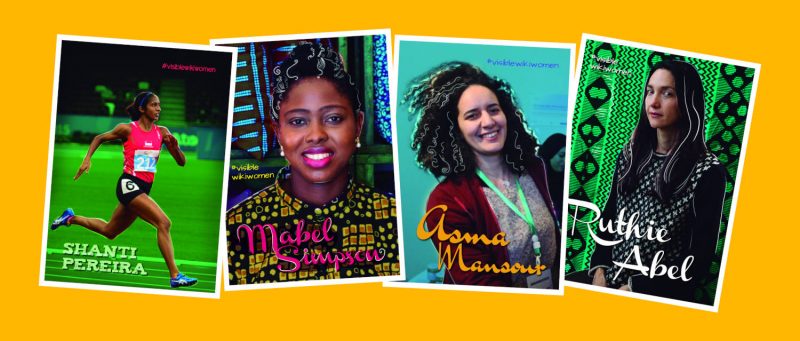RV Newsletter: Joining the campaign to help illustrate articles about women on Wikipedia

Graphic by Whose Knowledge? and available under a CC BY-SA 4.0 license.
Rising Voices note: Our biweekly newsletter provides a summary of our recent blog posts about all aspects of digital inclusion including access and adoption of digital tools, as well as different ways and opporunities for communities to fully participate online. Read here for previous editions of this newsletter.
The #VisibleWikiWomen campaign returns following a successful pilot campaign last year. Its primary goal is to provide resources to “illustrate articles of women on Wikipedia which didn’t have a picture.”
Coordinated by WhoseKnowledge? together with dozens of partner organizations and allies, the campaign seeks to increase the number of images available under free licenses on Wikimedia Commons, the online repository of multimedia files. The campaign invites participants to upload or donate images with the hope of adding at least 1600 new images of notable women. Participation begins March 8 and continues until May 8. Find out how you can participate here.
MORE FROM THE RISING VOICES BLOG
Via the partnership with Association for Progressive Communications (APC), Rising Voices continues to bring our readers content related to digital inclusion and online participation. Recent posts include republished versions of two country reports from the latest Global Information Society Watch (GISWatch) focusing on community networks, which are defined as “communication networks built, owned, operated, and used by citizens in a participatory and open manner.” In this issue, we invite you to take a closer look at the issue of community networks in Costa Rica and China.
Learn more about Onésimo Cruz Mejía, the host managing the @ActLenguas Twitter account during February 25-March 3, 2019 in a new social media campaign focusing on linguistic diversity online. He shared with us the current status of his language (Tu'un Savi, a Mixteco variant), efforts made in recovering the language, as well as what motivated him to be an indigenous language digital activist.
TRAININGS
The Knight Center for Journalism in the Americas is offering an online course on Visual Journalism. This course will focus on photography in the digital era from a humanistic tradition. The course is free for all. Duration: March 4-March 31, 2019
CONTESTS & COMPETITIONS
“Indigenous Youth Storytellers Circle: Share Your Story with the World,” an official project of Terralingua as part of the United Nations’ International Year of Indigenous Languages (#IYIL19), is calling for stories! If you are an indigenous youth (aged 18-25), please consider this opportunity to have your stories published online and/or in Terralingua’s Langscape Magazine for a global audience. Application due: June 1 for the Summer 2019 issue and October 1 for the Winter 2019 issue
UPCOMING EVENTS & CONFERENCES
Partnership for Progress on the Digital Divide (PPDD) 2019 is coming! If you’d like to present your work at the conference or provide a Position Paper for inclusion in the PPDD 2019 E-Book, please check this out and see the instructions for submitting your work. Submission due: March 18, 2019 at 11:59 p.m. (Hawaii Time)
The 14th Annual Meeting of the Internet Governance Forum (IGF 2019) is calling for workshop proposals on its three priority themes: (1) Data Governance; (2) Digital Inclusion; and (3) Security, Safety, Stability & Resilience. Please visit their site for details. Submission due: April 12, 2019 at 23:59 (UTC)
ADDITIONAL LISTENING ABOUT DIGITAL INCLUSION & ONLINE PARTICIPATION
- I laughed So Hard I Cried — the first episode of “Plays Well with Others” — a new podcast about the art and science of collaboration, brought to you by Creative Commons, and hosted by Creative Commons CEO Ryan Merkley. Take a listen!
- “Ask for what you want”: Sydette Harry’s strategies on how to decolonize the internet — the second episode of the Whose Knowledge? podcast, a series of interviews and a follow-up effort of the Decolonizing the Internet Conference. (Additional episodes: click here)
Subscribe to the Rising Voices Newsletter
Support our work
Since Rising Voices launched in 2007, we’ve supported nearly 100 underrepresented communities through training, mentoring, microgrants and connections with peer networks. Our support has helped these groups develop bottom-up approaches to using technology and the internet to meet their needs and enhance their lives.
Please consider making a donation to help us continue this work.



